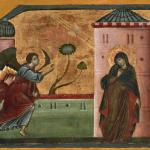 American rugged individualism has long created a detrimental effect on the psyche of American Christianity. The notion that we can work our way out of extreme poverty, all by ourselves, without need or help for anyone, has led to a spiritual form of that individualism which thinks we can and should work out our own salvation by ourselves without need for extraordinary grace or mercy. Just as those who believe they have come out on top on the social hierarchy due to their labors often look down upon the downtrodden poor for not being like them, so those who feel as if they have attained a high spiritual state with little to no sin often look down upon those who have greatly sinned and need mercy.
American rugged individualism has long created a detrimental effect on the psyche of American Christianity. The notion that we can work our way out of extreme poverty, all by ourselves, without need or help for anyone, has led to a spiritual form of that individualism which thinks we can and should work out our own salvation by ourselves without need for extraordinary grace or mercy. Just as those who believe they have come out on top on the social hierarchy due to their labors often look down upon the downtrodden poor for not being like them, so those who feel as if they have attained a high spiritual state with little to no sin often look down upon those who have greatly sinned and need mercy.
The Pharisee in the parable of the Publican and the Pharisee represents the individual who thanks God for allowing them to be all they can be all by themselves, not like all the lazy sinners who are not worthy of God’s glory. Jesus clearly stated that those who exalts themselves up for what they have done, for thinking themselves to be great, shall be humbled, while those who go to God seeking mercy shall attain that mercy:
He also told this parable to some who trusted in themselves that they were righteous and despised others: “Two men went up into the temple to pray, one a Pharisee and the other a tax collector. The Pharisee stood and prayed thus with himself, `God, I thank thee that I am not like other men, extortioners, unjust, adulterers, or even like this tax collector. I fast twice a week, I give tithes of all that I get.’ But the tax collector, standing far off, would not even lift up his eyes to heaven, but beat his breast, saying, `God, be merciful to me a sinner!’ I tell you, this man went down to his house justified rather than the other; for every one who exalts himself will be humbled, but he who humbles himself will be exalted” (Lk. 18:9-14 RSV).
Pope Francis has been consistently combating the individualistic spirit represented by the Pharisee. He has called such ideologues out, telling them to remember their place in the world comes not from themselves alone but the good graces given to them by society and by God. They would not be able to attain and be what they are all by themselves. Those who find themselves preserved from some sort of material or spiritual poverty need to realize it is not something they have done all themselves; they have relied upon others to get where they are at, and so should be thankful and mercy to others who have not had such success. Francis’s critics often cry out against God’s mercy as can be seen as those who have attacked and rejected Amoris Laetitia ; they are like the Novatians who ridiculed and decried the grace given to the lapsed during the time of persecution. They fail to recognize that mercy and grace have already been given to them all the while wanting to take it away from others; like the Unforgiving Servant (cf. Matt. 18:21-35), they will find themselves cut off from that grace once they reject such mercy for others.
It is this individualistic mentality, this lift yourself up out of your bootstraps ideology, which has led to a dangerous revolution in the Christian faith by creating and establishing a “neo-Pelagian” teaching that ends up rejecting grace, and therefore, the merciful spirit which Christians should have for others as well as for themselves. The Congregation for the Doctrine of Faith, following Pope Francis’s warning of a Promethean self-absorbed neo-Pelagianism in Evangelii Gaudium,[1] has raised this as a major concern in their recent letter, Placuit Deo:
A new form of Pelagianism is spreading in our days, one in which the individual, understood to be radically autonomous, presumes to save oneself, without recognizing that, at the deepest level of being, he or she derives from God and from others. According to this way of thinking, salvation depends on the strength of the individual or on purely human structures, which are incapable of welcoming the newness of the Spirit of God.[2]
Thus, the Congregation asked, “How would Christ be able to mediate the Covenant of the entire human family, if human persons were isolated individuals, who fulfil themselves by their own efforts, as proposed by neo-Pelagianism.”[3] Individualism rejects the communitarian aspect of human personality. We are not fully ourselves without the other. We can try to separate ourselves from the rest of humanity and from God and lift ourselves to some Promethean greatness in the world, but what we establish will not hold fast. Its base is weak and it will come crashing down like the Tower of Babel. We receive ourselves from others. We come into the world from others. We learn from others. We are given opportunities in the world through the society we find ourselves living. We are spiritually alive only in and through the grace of God. If we try to cut ourselves from everything and everyone else to lift ourselves up, we shall find the lament in Isaiah about Lucifer shall fall for us as well:
“How you are fallen from heaven, O Day Star, son of Dawn! How you are cut down to the ground, you who laid the nations low! You said in your heart, `I will ascend to heaven; above the stars of God I will set my throne on high; I will sit on the mount of assembly in the far north; I will ascend above the heights of the clouds, I will make myself like the Most High.’ But you are brought down to Sheol, to the depths of the Pit. Those who see you will stare at you, and ponder over you: `Is this the man who made the earth tremble, who shook kingdoms, who made the world like a desert and overthrew its cities, who did not let his prisoners go home?’ (Isa. 14:12-17 RSV).
We must be weary. We can think ourselves as great. We can attain great wealth and fame. People can come to idolize us and want to be like us. But all of this is nothing if we hold on to it all as the foundation by which we will be judged. Wealth does not make us spiritually great; fame is fleeting. Good fortune in the world can help us so long as we share our blessings with other. If we become prideful and haughty for what we have attained, we risk becoming like the Pharisee in Jesus’ parable, departing from God without his mercy and grace. Thus, the ideology promoted by American rugged individualism mislead us, and why, because of its prevalence in modern society, the Congregation stated:
The total salvation of the person does not consist of the things that the human person can obtain by oneself, such as possessions, material well-being, knowledge or abilities, power or influence on others, good reputation or self-satisfaction. [4]
Salvation is holistic. It heals us from our spiritual infirmities. Evil divides as salvation unites. Those who seek grace must seek it, not only for themselves, but for all. They must work for and form bonds with others. It is to the community of humanity as a whole, which redeemed is the Church, which Christ comes to heal; it is likewise as a community and not by ourselves we find ourselves open to the bond of love which ties us to the God who is love and opens us up to grace:
The place where we receive the salvation brought by Jesus is the Church, the community of those who, having been incorporated into this new order of relationship begun by Christ, can receive the fullness of the Spirit of Christ (cf. Rom 8:9). Understanding this salvific mediation of the Church is an essential help in overcoming all reductionist tendencies. The salvation that God offers us is not achieved with our own individual efforts alone, as neo-Pelagianism would contend. Rather, salvation is found in the relationships that are born from the incarnate Son of God and that form the communion of the Church.[5]
Pelagian thought makes it seem as salvation is something we can do by ourselves. Modern individualism offers worldly notions of salvation with the teaching that all things can be ours if only we work hard. Success stories are used to hide the millions of failures. But even those success stories themselves turn out to be failures for no matter what one has attained in the world, it shall all pass away, unless it is tied to the grace of God. Grace makes us join together with bonds of love, restoring what sin has destroyed in human relationships. Individualism cuts up humanity, following the breakdown of sin; grace and individualism cannot go together. The modern age, with its individualism promotes a counter-gospel tainted by the diabolical spirit of the antichrist. Either we humbly bow before God in an act of love, or we pridefully try to lift ourselves up with pride in a self-absorbed Promethean neo-Pelagianism which leads us to the abyss.
It’s our choice.
[Image=Tower of Babel By Constantine Manasses [Public domain], via Wikimedia Commons]
[1] “This worldliness can be fuelled in two deeply interrelated ways. One is the attraction of gnosticism, a purely subjective faith whose only interest is a certain experience or a set of ideas and bits of information which are meant to console and enlighten, but which ultimately keep one imprisoned in his or her own thoughts and feelings. The other is the self-absorbed promethean neopelagianism of those who ultimately trust only in their own powers and feel superior to others because they observe certain rules or remain intransigently faithful to a particular Catholic style from the past. A supposed soundness of doctrine or discipline leads instead to a narcissistic and authoritarian elitism, whereby instead of evangelizing, one analyzes and classifies others, and instead of opening the door to grace, one exhausts his or her energies in inspecting and verifying. In neither case is one really concerned about Jesus Christ or others. These are manifestations of an anthropocentric immanentism. It is impossible to think that a genuine evangelizing thrust could emerge from these adulterated forms of Christianity,” Pope Francis, Evangelii Gaudium. Vatican Translation. ¶94.
[2] Congregation for the Doctrine of Faith, Placuit Deo. Vatican Translation ( http://www.vatican.va/roman_curia/congregations/cfaith/documents/rc_con_cfaith_doc_20180222_placuit-deo_en.html ). ¶3.
[3] Congregation for the Doctrine of Faith, Placuit Deo. ¶4.
[4] Congregation for the Doctrine of Faith, Placuit Deo. ¶6.
[5] Congregation for the Doctrine of Faith, Placuit Deo. ¶12.
Stay in touch! Like A Little Bit of Nothing on Facebook













